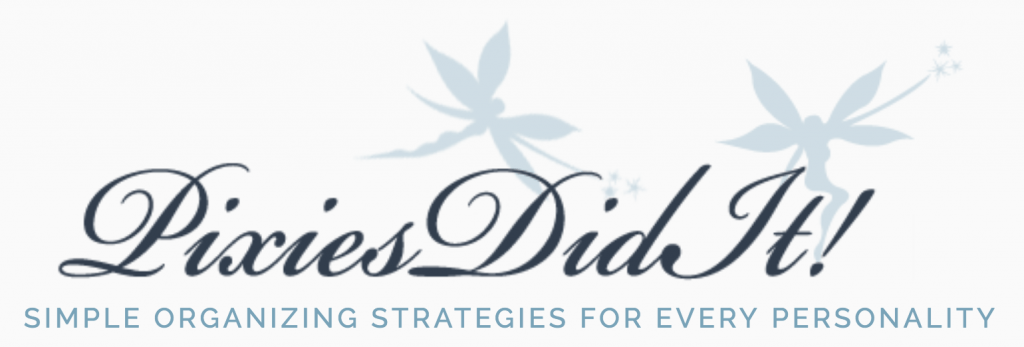Mom and Pop: Parenting By Type
Parenting. The hardest job you’ll ever love. One of the most important and fulfilling journeys you’ll ever take. Requiring a boatload of patience (and some more), a lot of love, oodles of commitment, and of course, the ability to roll with whatever comes your way. Being flexible when your nanny cancels on you on date night with your spouse, holding back what you REALLY want to say when you find the remote in the toilet bowl, or a little sneaker in the fish tank, or peanut butter all over the walls of the playroom. These are not requirements one hundred percent of the time, however they are attitudes to strive for when you have a little one — or three (or four!).
For all of us who haven’t mastered a consistently Zen-like attitude yet, there’s good news: You never will. Every parent, no matter what their type, will have good days and bad. That’s the name of the parenting game. But there are ways to make your path to ‘occasional Zen’ a bit smoother, and these all depend on your type.
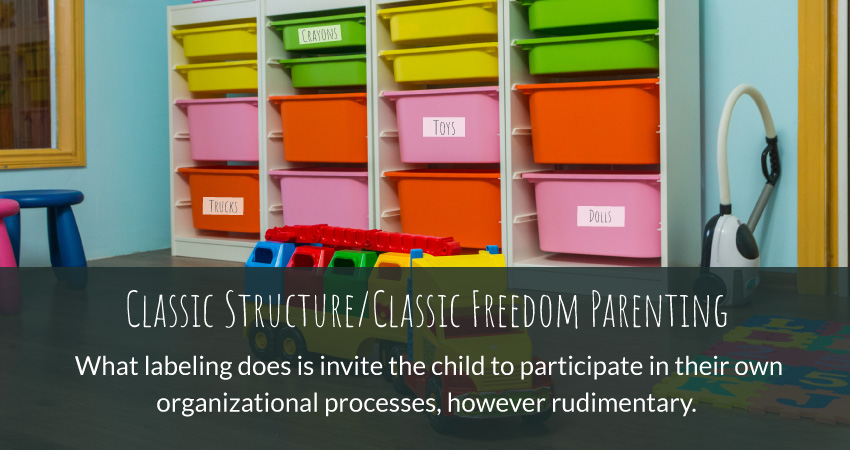
These types might enjoy some serenity more often than not, simply because they are the kings and queens of structure and rule-making. As we all know, kiddos need structure like they need food and water. Moreover, they need at least a modicum of structure to be created for (forced upon?) them in order to function and feel safe. Classic types do not use a modicum of structure — they use a whole bucketful. To-do lists for themselves, color-coded calendars for kid activities, individually-labeled homework and paperwork bins, labeled transparent bins for clothing storage, labeled hampers for laundry. Everything is labeled, which is actually not just a definite type A thing to do — it’s a useful tool for any kid-friendly household. What labeling does is invite the child to participate in their own organizational processes, however rudimentary.
What this type might need to learn is that with kids, things don’t always, or ever, work out the way you planned. And planning things out beforehand is one of the Classic Structure’s signature moves. Advice for this type of parent? Put the systems in place to the best of your ability, gently enforce the rules, stick to the schedule, but don’t be surprised if something goes awry or unfolds in a different way than you had imagined. Be a bit flexible and try to selectively pick your battles, and you’ll be golden.
Classic Freedoms are much like Classic Structures in that they are detail-oriented and organized, as well as unprepared for sudden schedule changes. The advice to stay flexible is definitely applicable here, however, there is one key way that Classic Freedoms differ from their more logical (and sometimes even ruthless) counterparts. This is when it comes to throwing things away. Classic Freedoms use their emotions to rationalize whether or not to keep something. Kids. Artwork. More artwork. All the artwork ever created by your child’s hands. Need we say more? What we will say is that if you are one of these types, and struggle with sentimentality when holding onto your child’s creations, (or even tests or homework papers) that you create a Later Box, and carefully store each piece in that, to be sorted through at a later date. Use folders or wax paper to protect the paper, and after the piece has had its allotted time on the fridge, into the Later Box it goes. This will help you keep your sanity around having clutter out of sight and hidden, but also respect your attachment to the things you feel you should keep.
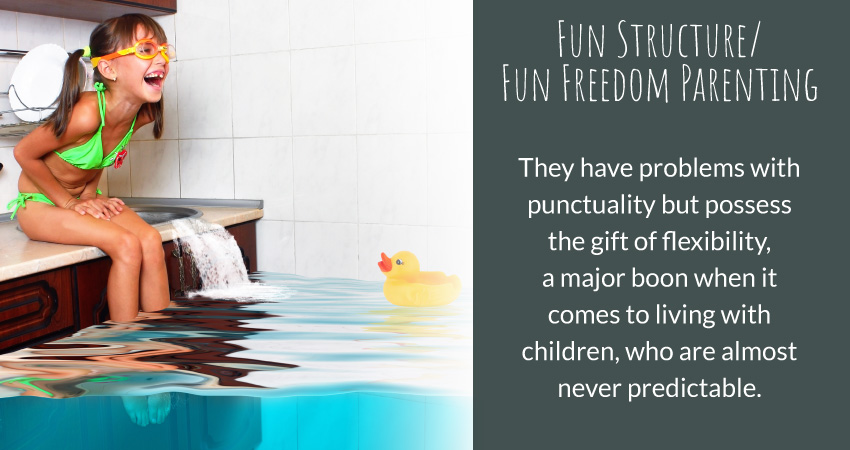
This type is very much driven by whim and mood. Though they are excellent decision makers in the moment, and good at details and organization, it’s really only when it suits them. They have problems with punctuality (which is a big no no when it comes to kids), but possess the gift of flexibility, a major boon when it comes to living with children, who are almost never predictable. Because of this ability to be on their toes at a moment’s notice and make snap decisions look easy, they are excellent in a crisis (which, as we all know, happens often when you have kids around).
Fun Freedoms have the same easy flexibility that Fun Structures have, and the same spontaneity, making them totally fun people for kids to be around. However, they aren’t very interested in schedules or routines, which is basically parental kryptonite, especially if you have more than one kid. They work well with things like filing cabinets and color-coded organizational tools. If they work with traditional organizational tools, such as wall calendars or day planners, they’ll do better at organizing their own life and that of their kid.
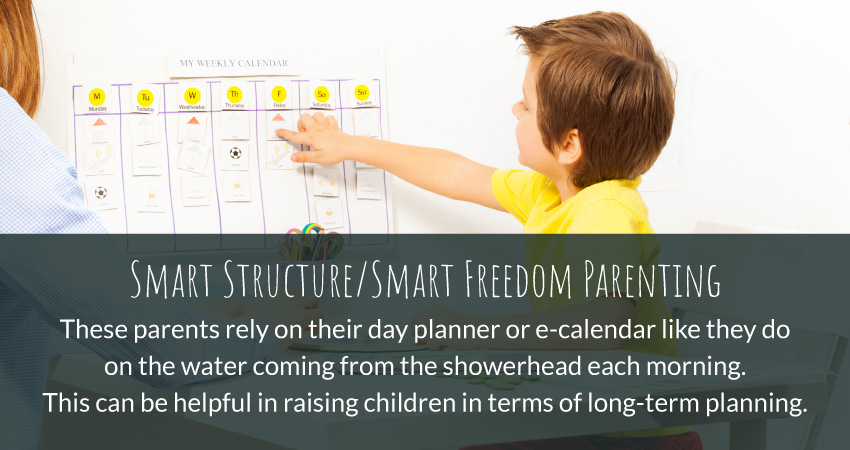
Smart Structure parents rely on their day planner or e-calendar like they do on the water coming from the showerhead each morning. It’s practically an appendage. They do this because they aren’t necessarily super detail-oriented. They can see the big picture sometimes, though they don’t focus on it. This can be helpful in raising children in terms of long-term planning, but having another person around who IS detail-oriented might be a good thing. However, it’s not necessary. These types are waaaay routinized, which can be a great thing for kids. However, a little looseness wouldn’t hurt the equation every once in a while.
Smart Freedoms are even more big picture than Smart Structures. While Smart Structures enjoy the minutiae of routines and schedules, Smart Freedoms are always, always looking at the big picture. Minutiae goes in drawers and is forgotten — this type needs to have everything out to see it. Whatever ways you can think of to contain all that clutter, paperwork, and other items, DO IT. And make sure that the containers are transparent, because if a Smart Freedom can’t see something, it doesn’t exist. This type wants to experience and understand life, so they can be incredibly empathic parental figures when it comes to the growing pains of kids.
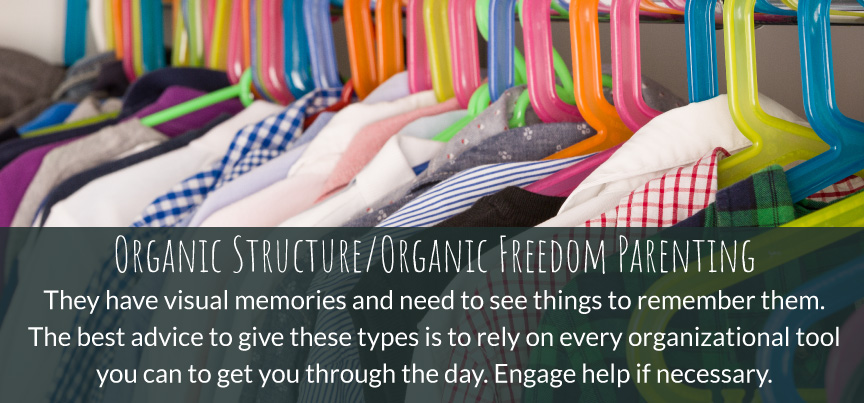
Organic Structures aren’t Classic Structures by any means, but they do well keeping their living space in order and sticking to routines. They also have a habit of keeping things out in the open, because they have visual memories and need to see things to remember them. In this way, transparent bins of every size are applicable here. A kid’s paperwork cubby will not work for this type — try transparent stand alone file bins instead. If you only use the day planner sporadically, get a digital calendar too, and use them both. Definitely utilize Later Boxes for clutter you can’t let go of. And if you become overwhelmed by clutter, get some help — hire a professional organizer to set you straight.
Organic Freedoms are similar to Organic Structures, but without the structure. Meaning, they buck at mundane routine and scheduling (though events that happen on a regular basis are easier to remember), do things in the moment, make piles ad nauseum, and again, need to see things to remember them. The best advice to give these types is to rely on every organizational tool you can to get you through the day. Engage help if necessary. And do not sweat the small stuff (chances are, you already don’t).
